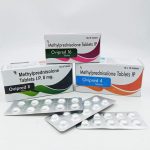How Long Does Dexamethasone Stay In Your System?

Dexamethasone is a corticosteroid used in a wide range of conditions for its anti-inflammatory and immunosuppressant effects. It provides relief for inflamed areas of the body. It is used to treat a number of different conditions, such as inflammation (swelling), severe allergies, adrenal problems, arthritis, asthma, blood or bone marrow problems, kidney problems, skin conditions, and flare-ups of multiple sclerosis. Dexamethasone is a corticosteroid (cortisone-like medicine or steroid). It works on the immune system to help relieve swelling, redness, itching, and allergic reactions.
Dexamethasone tablets are also used in combination with other anti-myeloma products for the treatment of adults with multiple myeloma.
Dexamethasone was tested in hospitalized patients with COVID-19 in the United Kingdom’s national clinical trial recovery and was found to have benefits for critically ill patients. According to preliminary findings shared with WHO (and now available as a preprint), for patients on ventilators, the treatment was shown to reduce mortality by about one third, and for patients requiring only oxygen, mortality was cut by about one fifth.
This medicine is available only with your doctor’s prescription. This product is available in the following dosage forms:
- Tablet
- Elixir
- Solution
How should dexamethasone be used?
Dexamethasone comes as a tablet and a solution to take by mouth. Your doctor will prescribe a dosing schedule that is best for you. Follow the directions on your prescription label carefully, and ask your doctor or pharmacist to explain any part you do not understand. Take dexamethasone exactly as directed. Do not take more or less of it or take it more often than prescribed by your doctor.
Do not stop taking dexamethasone without talking to your doctor. Stopping the drug abruptly can cause loss of appetite, upset stomach, vomiting, drowsiness, confusion, headache, fever, joint and muscle pain, peeling skin, and weight loss. If you take large doses for a long time, your doctor probably will decrease your dose gradually to allow your body to adjust before stopping the drug completely. Watch for these side effects if you are gradually decreasing your dose and after you stop taking the tablets or oral liquid, even if you switch to an inhalation corticosteroid medication. If these problems occur, call your doctor immediately. You may need to increase your dose of tablets or liquid temporarily or start taking them again.
How long does dexamethasone stay in your system?
There are several factors that come into play when estimating how long Dexamethasone will stay in your system because every patient has physiology unique to them. Here are some major factors you should consider when trying to understand how long Dexamethasone will stay in your body:
• Age: Typically, the younger you are, the more efficient your body functions are. The more efficient your body functions, the faster Dexamethasone will be removed from your system.
• Body height/weight/fat: Your specific prescribed Dexamethasone dosage corresponds to your body height, weight, and fat. Usually, larger people will be given a higher dosage of Dexamethasone. The higher the dose of Dexamethasone you have been taking, the longer Dexamethasone will take to be removed from your system.
• Genetics: Genes predispose people to different metabolic functions, which is a key factor in how your body processes medications like Dexamethasone. For this reason, your genetic makeup comes into play when estimating how long Dexamethasone will remain in your system.
• Kidney and liver functions: The liver and kidneys eliminate everything you ingest, and Dexamethasone is no exception. If your liver or kidneys are damaged, it will most likely take longer for your body to remove the Dexamethasone from your system.
• Metabolism: Your metabolism determines how quickly you process foods, liquids, and medications such as Dexamethasone. If your metabolism is slow, it will take longer for your body to process and eliminate Dexamethasone from its system than someone with a fast metabolism.
• Usage frequency: The longer you have been taking Dexamethasone, the longer it will remain in your system. For example, it will take longer for someone who has taken Dexamethasone for several years to remove Dexamethasone from the body than someone who has only been taking Dexamethasone for a few months.
Peak effects of dexamethasone are reached within 10 to 30 minutes of administration. However, dexamethasone has a long biological half-life (36-54 hours), meaning that only half of the drug has been eliminated in the body after this period. About 94 to 97% of a drug will have been eliminated after 4 to 5 half-lives. Thus, it follows that after 4 to 5 half-lives, the plasma concentrations of a given drug will be below a clinically relevant concentration and thus will be considered eliminated. This means that dexamethasone will clear out of a person’s system within 12 days (270hours) after the last dose but the elimination may vary based on multiple factors already stated above.
How long do the effects of dexamethasone last?
Dexamethasone is a long-acting, systemic corticosteroid; its potency is about 25 times greater than the short-acting products. Dexamethasone has a half-life of over 2 days as a result many of the temporary side effects such as mood changes or anxiety, will begin to wear off as the serum concentration of the drug continue to fall.
What are the side effects of dexamethasone?
Dexamethasone may cause side effects. Tell your doctor if any of these symptoms are severe or do not go away:
• acne
• anxiety
• depression
• dizziness
• easy bruising
• headache
• increased hair growth
• insomnia
• irregular or absent menstrual periods
• restlessness
• stomach irritation
• upset stomach
• vomiting
If you experience any of the following symptoms, call your doctor immediately:
• black or tarry stool
• cold or infection that lasts a long time
• muscle weakness
• skin rash
• swollen face, lower legs, or ankles
• vision problems
If you experience a serious side effect, you or your doctor may send a report to the Food and Drug Administration’s (FDA) MedWatch Adverse Event Reporting program online (http://www.fda.gov/Safety/MedWatch) or by phone (1-800-332-1088).





